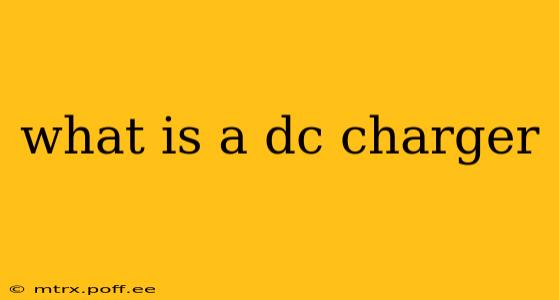DC chargers, also known as DC fast chargers, are devices that rapidly charge electric vehicle (EV) batteries using direct current (DC) electricity. Unlike AC chargers (Level 1 and Level 2 chargers), which convert alternating current from the grid to direct current for charging, DC fast chargers supply DC power directly to the EV's battery, significantly reducing charging time. This makes them a crucial part of the EV infrastructure, especially for long-distance travel.
How Does a DC Fast Charger Work?
DC fast chargers bypass the on-board charger in the EV, which is responsible for converting AC to DC in slower charging methods. Instead, they directly supply high-voltage DC power to the vehicle's battery. This direct power transfer allows for much higher charging rates, resulting in a substantial reduction in charging time. The charging speed depends on factors like the charger's power output (measured in kilowatts, kW), the EV's battery capacity, and the vehicle's on-board charging system capabilities.
What are the Different Types of DC Fast Chargers?
Several standards exist for DC fast charging, leading to a variety of connectors and charging protocols. The most common standards include:
- CCS (Combined Charging System): A popular standard in Europe, North America, and parts of Asia. It combines AC and DC charging capabilities in a single connector.
- CHAdeMO (Charge de Move): Predominantly used in Japan and some other parts of the world. Known for its high-voltage capabilities.
- GB/T: The primary standard in China.
The specific connector type you'll need depends on your EV model. It's crucial to check your vehicle's compatibility before using a DC fast charger.
What are the Advantages of DC Fast Chargers?
The primary advantage of DC fast chargers is their speed. They can add a substantial range to an EV's battery in a relatively short time, making them ideal for long journeys and reducing range anxiety. Other advantages include:
- Reduced charging time: Significantly faster than AC charging.
- Increased convenience: Allows for quicker charging stops during long trips.
- Improved range: Adds substantial miles of range in a short amount of time.
What are the Disadvantages of DC Fast Chargers?
While DC fast charging offers significant benefits, there are also some drawbacks to consider:
- Higher cost: DC fast chargers are typically more expensive to install and maintain than AC chargers.
- Potential battery degradation: Frequent use of DC fast charging might lead to slightly faster battery degradation compared to slower charging methods, although this effect is often minimal and mitigated by modern battery management systems.
- Limited availability: While the network of DC fast chargers is expanding rapidly, it's still not as widespread as AC charging stations.
How Much Does it Cost to Use a DC Fast Charger?
The cost of using a DC fast charger varies significantly depending on the location, the operator of the charging station, and the charging rate. Some stations offer fixed pricing per charging session, while others charge based on the amount of energy consumed (kWh). It's always advisable to check the pricing details at the charging station before commencing a charge.
How Long Does it Take to Charge with a DC Fast Charger?
Charging times vary greatly based on the charger's power output, the EV's battery capacity, and the state of charge. A typical DC fast charger might add 80% of the battery capacity in 30-45 minutes, but this can range from less than 20 minutes to over an hour depending on the aforementioned factors.
Is DC Fast Charging Bad for My EV Battery?
While some concerns exist regarding the potential for accelerated battery degradation with frequent DC fast charging, modern EVs are designed to mitigate this risk through sophisticated battery management systems. Occasional DC fast charging is generally considered safe and unlikely to cause significant long-term damage to the battery. However, excessive and frequent fast charging could potentially impact longevity slightly more than slower charging.
What is the difference between AC and DC chargers?
The fundamental difference lies in the type of electricity they use. AC chargers use alternating current from the grid, which needs to be converted to DC by the onboard charger in the EV before it can charge the battery. DC chargers, on the other hand, supply direct current, bypassing the need for this conversion and enabling much faster charging speeds. AC charging is slower but generally more widely available and less expensive.
This comprehensive guide provides a detailed overview of DC chargers, addressing common questions and concerns about this crucial technology in the electric vehicle landscape. The continued expansion of DC fast charging infrastructure is vital for wider EV adoption and addressing range anxiety.
